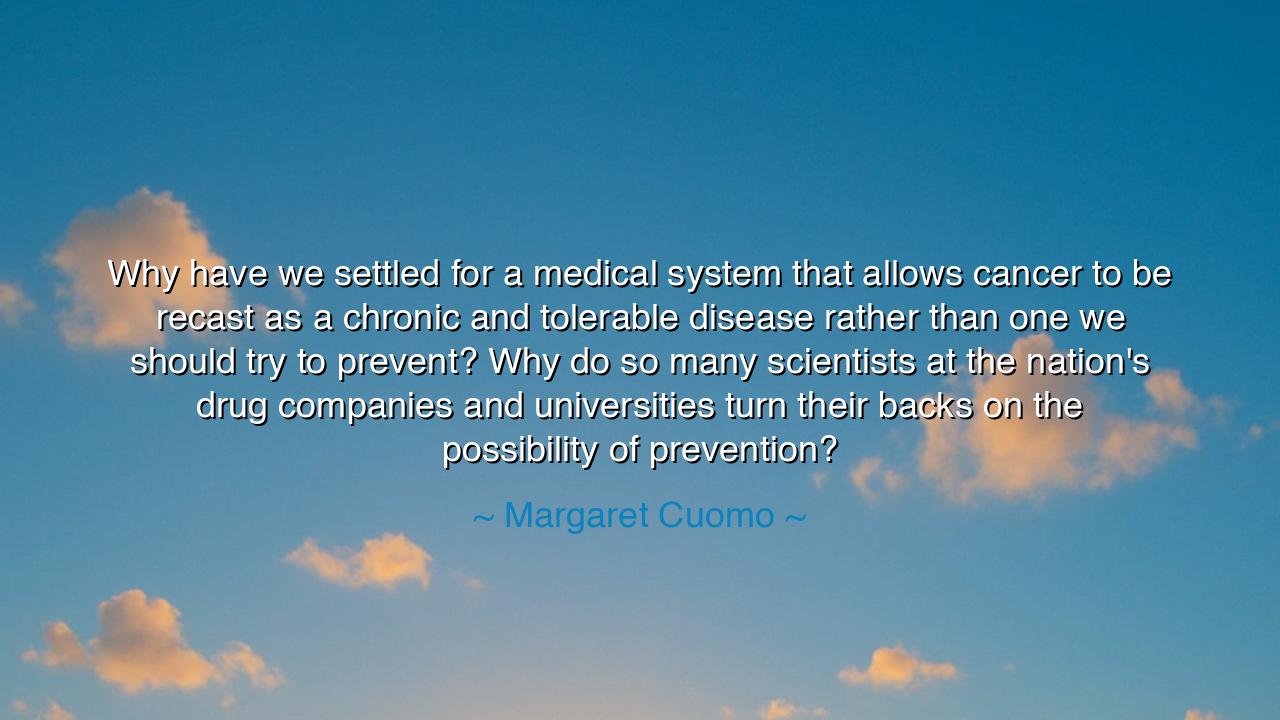
Why have we settled for a medical system that allows cancer to be
Why have we settled for a medical system that allows cancer to be recast as a chronic and tolerable disease rather than one we should try to prevent? Why do so many scientists at the nation's drug companies and universities turn their backs on the possibility of prevention?






“Why have we settled for a medical system that allows cancer to be recast as a chronic and tolerable disease rather than one we should try to prevent? Why do so many scientists at the nation’s drug companies and universities turn their backs on the possibility of prevention?”
Thus spoke Margaret Cuomo, physician and daughter of public service, whose words pierce through the complacency of our age like a bell in the silence of dawn. Her voice trembles not with anger, but with righteous concern, for she calls attention to one of the greatest paradoxes of modern medicine: that in our pursuit to treat disease, we have forgotten the higher calling to prevent it. In this lament, she awakens us to a truth the ancients once knew well — that it is far wiser to guard the city before the enemy arrives than to rebuild it after it burns.
To understand the origin of her words, we must look to the nature of the world she inhabits — a world where the medical system, vast and powerful, often measures success not by the eradication of suffering, but by its management. Cancer, once a whisper of doom, is now approached as a chronic condition to be endured through drugs, therapies, and endurance. Yet Cuomo asks: is this victory, or surrender? Is the human spirit truly fulfilled when it learns to coexist with the shadows, rather than dispel them? Her question is a challenge — not to science, but to its direction. For in her eyes, medicine has become a guardian of the sick rather than a protector of the healthy.
In the ancient world, the wise saw health as harmony — a balance between the body, the mind, and the world around them. The Greek physician Hippocrates, father of medicine, once declared: “Prevention is better than cure.” His disciples were not content to treat symptoms; they sought to understand the rhythms of life itself, the seasons of nature, the habits of living that either nurtured vitality or invited decay. Yet, in our modern era, the harmony of health has been replaced by the mechanics of survival. We have built empires of treatment, yet neglected the temples of prevention. Cuomo’s words are a call to return — not backward into superstition, but forward into wisdom.
Her lament also touches upon the moral economy of medicine — the uneasy truth that curing disease is profitable, but preventing it may not be. In the halls of research and industry, countless minds labor to design new drugs, new machines, new interventions — but few are charged to seek the causes that might make such inventions unnecessary. The marketplace of medicine, she suggests, has lost its compass. The scientist’s genius has been chained not to curiosity, but to commerce. Cuomo’s question — “Why do they turn their backs on prevention?” — is not a condemnation of science, but a plea for redemption. For she knows that the true healer does not seek wealth or fame, but the flourishing of life itself.
There is a story from the old empire of China, where it was said that the best physician was not the one who cured illness, but the one who prevented it altogether. The emperor rewarded those doctors whose patients never fell sick, for such wisdom preserved the strength of the realm. This tale mirrors Cuomo’s cry — that the highest art of medicine is not found in hospitals or laboratories, but in the daily discipline of health, in the soil we tend, the food we eat, the air we breathe, and the choices we make. To neglect these is to invite the silent armies of disease to conquer us from within.
Yet her words are not only for physicians and scientists — they are for every soul who seeks a better world. For prevention is not a task of experts alone; it is a calling for all who live. Each act of care — choosing nourishment over indulgence, rest over haste, mindfulness over neglect — is a rebellion against decay. Cuomo reminds us that we, too, bear responsibility for the sanctity of our bodies. She teaches that health is not a gift to be demanded, but a discipline to be practiced, a covenant between the self and the universe that sustains it.
And so, the lesson of Margaret Cuomo’s words is both simple and profound: do not settle for survival when you are meant to thrive. Demand of your world not merely cures for disease, but pathways to wellness. Urge your leaders, your institutions, and your scientists to remember that the truest victory over suffering is not endurance, but prevention. For the civilization that forgets to prevent its ills — whether of the body or of the soul — walks toward ruin, not progress.
Let us, then, reclaim the wisdom of both ancients and healers: to live not in fear of illness, but in pursuit of health. To guard the gates of life before they fall. And when future generations ask what we did with the knowledge entrusted to us, may they say: “They remembered the sacred duty of medicine — to protect, to preserve, and to prevent.” For in that remembrance lies the promise of a healthier, nobler world.






AAdministratorAdministrator
Welcome, honored guests. Please leave a comment, we will respond soon